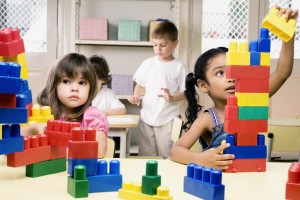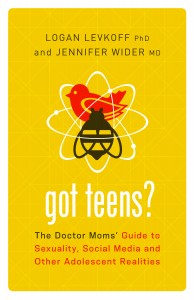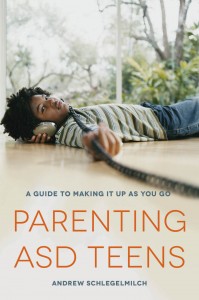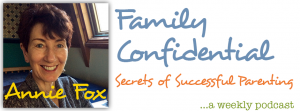|
|
April 15, 2014
 Actually, we’re playing AND learning! In my senior year in college I took a course called “Observation of Young Children.” For several hours a week I sat in a narrow, darkened room, behind a one-way mirror, looking into a pre-school classroom in action. Over the course of the semester I was assigned several 2-4 year olds to “observe” and to keep a log of every single thing the child did, how long he or she engaged in the behavior, etc. Later, I was to write up my detailed conclusions about whatever patterns I observed and what they might indicate about “my kids'” temperament, interests, learning styles, etc.
What I remember most was how seriously these young children took “playtime.” It was clear they were intently busy learning through play.
So in the late ’90s, when I first heard about Baby Einstein, a series of products of the “teach your baby to read” variety, I was skeptical. Babies and young children are in the business of figuring out how the world and everything and everyone they encounter operates. Hands-down, they learn best, with the greatest enthusiasm and retention, through hands-on exploration. (That includes but is not limited to touching, holding, jumping on, crawling through, rolling in, and sticking it in your mouth exploring.)
When I first heard about Brain Insights, my first thought was, “Oh is this another product for helicopter parents who need to chill?” Turns out, happily, it is not. Instead, Brain Insights, founded by early childhood educator, Deborah McNelis, is about understanding your child’s early brain development and using that to support a child’s learning through relaxed play. Bye bye smart apps for over-scheduled toddlers. Hello natural, hands-on parent-child fun!
Listen here to my conversation with Debora McNelis on this week’s Family Confidential podcast.

March 24, 2014
I was in high school when I read David and Lisa, by Theodore Rubin. (The book and the ground-breaking film on which it’s based, are both profound and well worth checking out.)
David and Lisa are a couple of teens with “issues” who meet and fall in love in a residential treatment center. When the kids from the center go on a neighborhood field trip they encounter a group of “typical” teens who mock them viciously for not being “normal.” To which David counters: “If you’re normal who wants to be normal??” (Best comeback ever!)
The character’s self-confident defiance launched a personal revolution inside my head. Come to think of it, that single line of dialogue has probably been the engine driving much of what I do, what I write, and what I teach.
 User’s manual for parents of teens So what is “normal”? That’s what I wanted to explore when I sat down recently with my Family Confidential podcast guest, Dr. Jennifer Wider MD. Jennifer aka, Jena, is a nationally renowned women’s health expert, author, and radio host. Her weekly radio segment on Cosmo Radio is called “Am I Normal?” Dr. Wider’s latest book (co-authored with Logan Levkoff, PhD) is Got Teens? The Doctor Moms’ Guide to Sexuality, Social Media and Other Adolescent Realities. Learn more at DrWider.com.
Jena and I had such a dynamic conversation about the myth of “normal” I wanted to share it here. I can’t think of anything more essential to the emotional well-being of young people than helping them bust out the confines of living up to someone else’s idea of how they should look, feel and think so they can gain confidence to be themselves. Listen in on our conversation here.

March 17, 2014
 We’re all “making it up” as we go along, aren’t we? It’s been nearly seventeen years since I launched my first teen website (TheInSite). And what I know from the non-stop flow of email questions is that dating is hard for all teens. For teens on the spectrum, who have challenges reading social cues as well as a lower need for attachment and emotional connection than neuro-typical kids, dating can be especially daunting.
Enter Dr. Andrew Schlegelmilch, Ph.D., clinical psychologist who specializes in working with individuals who have Autism Spectrum Disorder (ASD) and their families. He’s also the Head Psychologist at Orion Academy, a preparatory high school for ASD teens in Moraga, California, where, among his other duties, he teaches classes in Sex and Dating. His new book, Parenting ASD Teens will be available in May.
Recently I had the pleasure of interviewing Andrew for my Family Confidential podcast. We talked openly about helping teens with ASD understand sex and navigate their social lives. Listen in here.

February 15, 2014
 Laugh. Listen. Learn. Strengthen your family. I love listening to great podcasts and I love producing them. That’s why I felt sad (and a tad guilty) when “other stuff” forced David and me to go on hiatus in 2011 from my Family Confidential podcast. The break allowed us to develop several award-winning books and apps, but it was always my intention to get back in the studio with a weekly podcast. We’re back now, with video, and it feels great.
So grab a cup of coffee and c’mon over to Family Confidential where you can choose from an impressive range of engaging conversations with top parenting experts. (All free… of course!) Whether you’re looking for information about picky eaters, single parenting, advocating for your child with special needs, handling moody teens or improving your relationship with your step kids (who may also be moody teens), you’ll find it at Family Confidential. You’ll also find lots to think about, lots to laugh about, and many proven strategies for parenting kids in the 21st century and teaching them to be good people.
Got your coffee? I’ve got mine. Now let’s check out our most recent podcasts together:
Kelly Hirt: Lifeline tips for special needs parents
Dr. Lynne Kenney: Helping your kids blossom
Sarah Newton: The push kids need to succeed
Rosalind Wiseman: Violent video games, what parents can do
Carrie Goldman: Tweens and Social Media
Tune in every Friday for a new Family Confidential podcast. Until then, happy parenting!
 — Older Posts »
| |















